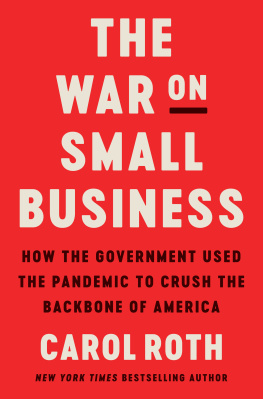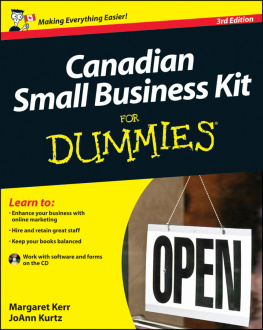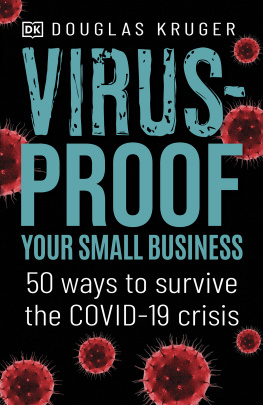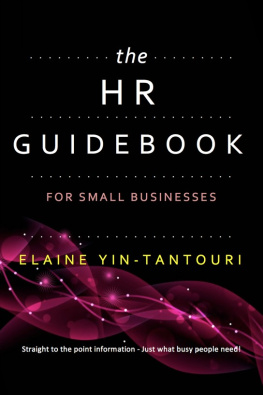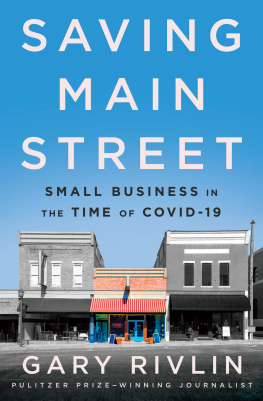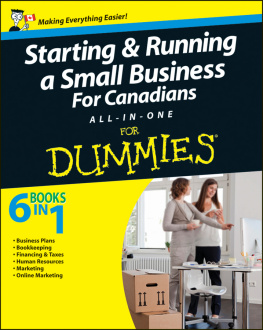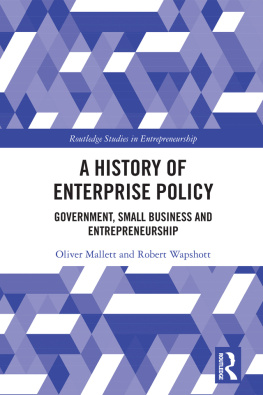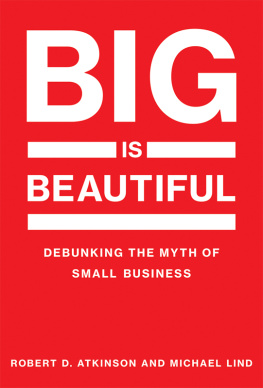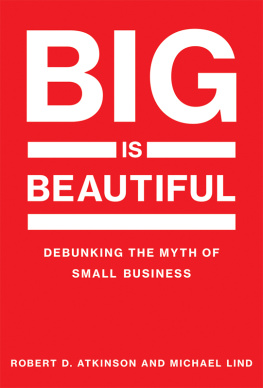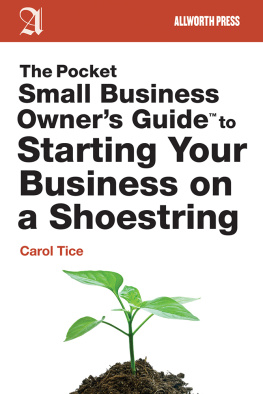The Entrepreneur Equation: Evaluating the Realities, Risks, and Rewards of Having Your Own Business
THE WAR ON SMALL BUSINESS . Copyright 2021 by Carol Roth. All rights reserved under International and Pan-American Copyright Conventions. By payment of the required fees, you have been granted the nonexclusive, nontransferable right to access and read the text of this e-book on-screen. No part of this text may be reproduced, transmitted, downloaded, decompiled, reverse-engineered, or stored in or introduced into any information storage and retrieval system, in any form or by any means, whether electronic or mechanical, now known or hereafter invented, without the express written permission of HarperCollins e-books.
Broadside Books and the Broadside logo are trademarks of HarperCollins Publishers.
COVER DESIGN BY ANDREA GUINN
FIRST EDITION
Library of Congress Cataloging-in-Publication Data
Names: Roth, Carol (Carol J. S.), author.
Title: The war on small business: how the government used the pandemic to crush the backbone of America / Carol Roth.
Description: First edition. | New York, NY: Broadside Books, an imprint of Harper Collins Publishers, [2021] | Includes index. | Summary: For years, government bureaucrats have been looking for ways to destroy small businesses. With coronavirus, they finally had their chance.Provided by publisher.
Identifiers: LCCN 2021014692 | ISBN 9780063081413 (hardcover) | ISBN 9780063081420 (ebook)
Subjects: LCSH: Small businessUnited StatesHistory21st century. | Government aid to small businessUnited StatesHistory21st century. | COVID-19 Pandemic, 2020Economic aspectsUnited States.
Classification: LCC HD2346.U5 R68 2021 | DDC 338.6/420973dc23
LC record available at https://lccn.loc.gov/2021014692
Digital Edition JUNE 2021 ISBN: 978-0-06-308142-0
Version 05202021
Print ISBN: 978-0-06-308141-3
This book is dedicated to my father, Bernie, who loved America and was the embodiment of the American Dream.
This book is likewise dedicated to all the small business owners who, despite the odds, continue to fight and persevere.
In 2010, I wrote a book, The Entrepreneur Equation, that warned small business owners about the risks of entrepreneurship and owning a business. I made a case for why it is so hard to be a small business owner and entrepreneurlet alone a successful one. I covered how ideas are easier than execution, why you are never really the boss, the competitive landscape, and why everything takes longer and is more expensive and more difficult than you expect it to be and probably should be. I talked about the challenges of managing cash flow, employees, and customers in an ever-changing world.
With all of the challenges that encompass entrepreneurship, never, ever did I think that the most significant risk facing a small business in the United States of America was the risk of the government shutting them down for months on end and preventing businesses from operating.
Small business is the backbone of any economy. More than 99 percent of all businesses in America and worldwide are small businesses. In the United States, they account for around half the economy, but individually, they remain fraught with risk and fragility. The threats that small businesses face daily are varied and numerous, which is why so many small businesses fail and so many more fail to succeed.
Still, millions of small businesses persevere each day in the face of this multitude of threats. Moreover, the United States attracts entrepreneurs from all around the world because (1) some small businesses grow up to be the biggest companies on the planet, and (2) even those that stay smaller can determine and pursue their own definition of success. Small businesses support families, communities, and economic growth. So it is even more staggering to find that the biggest threat not only to their success but also to their existence is the US government.
Of course, government has always been an economic impediment to small businesses. City and state permitting policies in cities such as San Francisco and New York City prevent those without huge budgets from even being able to open a business. (A 2019 article by the San Francisco Apartment Association says you should have $350,000 to $500,000 in liquid capital because of permit delays just to consider opening certain bricks-and-mortar businesses there.) Licensing requirements and other laws further slant the ability to start and maintain a business toward those who already have created wealth. Licenses, permits, and other government-mandated business requirements are a cash cow for government and their cronies at small businesses expense. And then there is local governments penchant for giving tax breaks and other incentives to entice big businesses to their cities and states, without providing the same, or in many cases, anything of substance, for smaller operators.
Then came 2020, when governors and mayors alike, particularly in big and blue states and cities, played an all-out nasty, uneven, and rigged game of picking economic winners and losers. To no ones surprise, this did not work out well for many clout-lacking small business owners. State and local governments decided big retailers could continue to operate while shuttering their smaller competition; smaller retailers, many of which offered the same or similar goods and services, found their businesses shut down. Small companies were forced to close and their employees required to stay home, while bigger companies and those that were well connected could remain open and be the beneficiaries deemed, by government mandate, to be essential.
The War on Small Business is a book about the aftermath of bureaucrats who want to control everything realizing how hard small businesses are to control. Its a book about the battle between central planning and consolidated power versus decentralization.
When the federal government stepped in with its assistance via the Coronavirus Aid, Relief, and Economic Security (CARES) Act, it clearly favored the big, wealthy, and well connected. Whereas the Senate tried to pass a more streamlined assistance bill, Speaker Nancy Pelosi and the House of Representatives wouldnt pass a bill unless it was packed with cash for their cronies. While small business owners were forced to duke it out for limited funding under the Paycheck Protection Program (PPP) provision, the broader CARES Act gave away millions to politicians buddies such as the Kennedy Center (which ended up furloughing its orchestra and other staff after receiving $25 million, no strings attached), colleges and universities, including those that had multibillion-dollar endowments (many that were ultimately shamed into giving it back), and other friends of government.
Even the PPP itself, a provision of the CARES Act aimed at assisting small businesses, was passed late given the circumstances, after many small businesses were already struggling from the government-mandated lockdowns. Moreover, the CARES Act made small businesses further government victims. The poor structuring of the PPP, whether intentional or not, left commercial banks making the decision to give their best customers (aka larger customers) preference, and initially left many of the smallest entities out in the cold. Though many larger funding recipients were shamed into giving back some of those loans and the PPP funding was ultimately expanded, the smallest businesses suffered to a point where we dont yet know the full damage.
Through these stories and others, I will explore two ideas. The first is about capitalism. Many of the critics on the left are correct that a problem exists. They see individuals and companies such as Jeff Bezos and Amazon achieving unparalleled wealth and value, and they sense something in the country is off course. However, critics consistently get these kinds of conflicts wrong. They think that government is the solution when in fact government created the problem. They misread the signs of impending disaster and too often lobby and fight for measures that will make the situation worse. Americas big business problem is not what those critics think it is. Its not capitalism that gave the country a slew of companies with outsized power and control. In fact, only free market capitalism can fix it. These critics on the left look at Americas greatest strength and mistake it for its greatest weakness.
Next page
